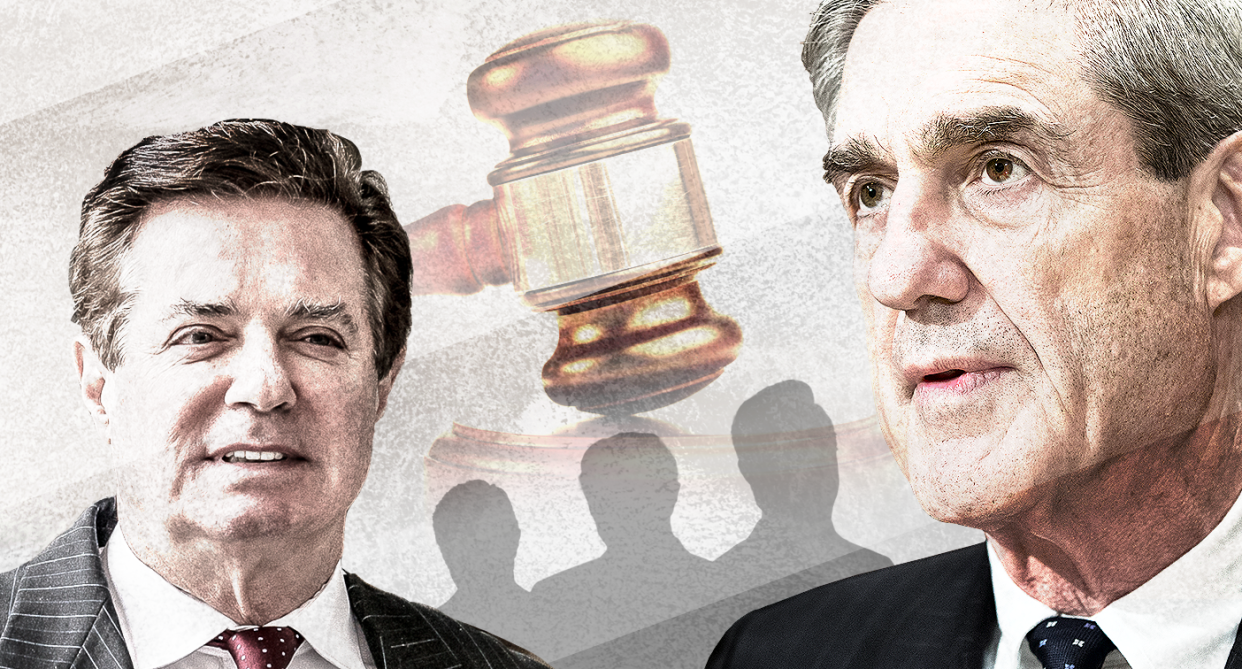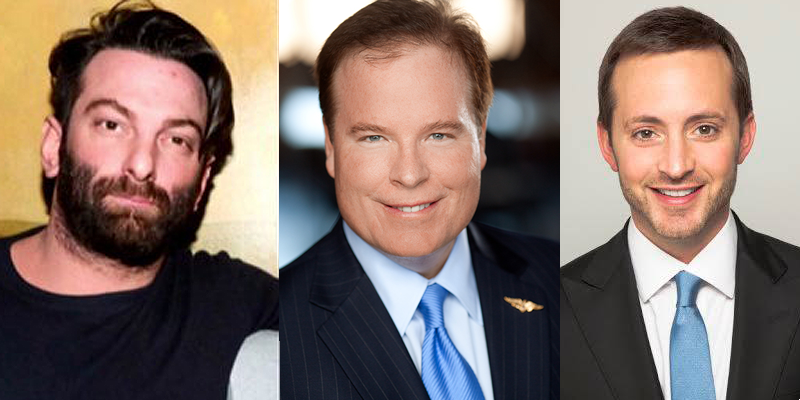3 missing men at the Manafort trial

ALEXANDRIA, Va. — As the trial of President Trump’s former campaign chairman resumed Monday, it appeared prosecutors from special counsel Robert Mueller’s office had decided not to call three seemingly key figures. The absence of these witnesses offers intriguing hints about potential ongoing investigations and additional prosecutions that could yet take place.
It became clear these witnesses would not appear when Greg D. Andres, Mueller’s lead prosecutor at Paul Manafort’s trial for alleged financial fraud, confirmed to Judge T.S. Ellis III before court let out last week that the prosecution has only one or two more witnesses to present to the jury. The prosecutors’ final witnesses will be James Brennan, an officer of the Federal Savings Bank, and potentially Paula Liss, a senior special agent at the Treasury Department’s Financial Crimes Enforcement Network.
Last week, Richard Gates, Manafort’s erstwhile right-hand man who pleaded guilty and agreed to cooperate with the Mueller team earlier this year, provided both damaging testimony against Manafort and an opportunity for the defense team to take some heat off their client with a withering cross-examination, which featured dramatic exchanges about Gates’s marital infidelity, his padding of expense reports and his admitted theft of Manafort’s funds.
While the drama over Gates’s appearance captured a great deal of attention, the absence of other key figures has gone largely undiscussed. This brief list, which is by no means comprehensive, includes several people who are knowledgeable about Manafort’s alleged crimes, according to the testimony of other witnesses, but who are not being called by prosecutors to the stand:
1. Jeffrey Yohai – Manafort’s former son-in-law. Given earlier reporting that he was cooperating with federal investigators, Yohai’s absence from the prosecution’s witness list in Alexandria is one of the towering mysteries in the case. Manafort’s daughter Jessica divorced Yohai last year, but before the marriage broke up, Yohai was Manafort’s real estate partner.
One part of the alleged bank fraud scheme involves Yohai and Manafort seeking loans from the Banc of California to buy or build houses and apartment complexes to rent out in Southern California. A Banc of California employee called to the stand this week testified that Yohai did not bring much to the relationship. Yohai personally offered “very weak financial support,” Gary Seferian testified, and the properties he and Manafort asked the bank to finance were less complete than Yohai had claimed. Prosecutors also had Seferian read from a May 2016 email he’d written indicating that Yohai had “no experience” flipping the sort of expensive Los Angeles homes he and Manafort planned to buy. Unimpressed with Yohai, the bank looked to Manafort’s assets and income as the primary source of repayment for their loans, and prosecutors allege that Manafort had misrepresented those finances.
A separate part of the alleged bank fraud scheme involved Manafort seeking more favorable terms on loans from Citizens Bank by misleading the bank and its appraisers about the use of his condo in the SoHo neighborhood of Manhattan. Jurors heard testimony from Citizens Bank employees and were shown emails indicating that Manafort recruited his own daughter and Yohai into putting on a charade for the bank’s appraiser. “Remember, he believes that you and Jessica are living there,” Manafort wrote to Yohai in one email. The purpose of the ruse was to persuade Citizens Bank that the extended Manafort family was using the condo as a second home, when in truth Manafort was renting out the condo on Airbnb and similar websites. (A former Navy SEAL who now works at Airbnb described to the jury how often the condo was listed on the site.)
Several media outlets reported earlier this year that Yohai had struck a plea agreement with the U.S. attorney’s office in Los Angeles and agreed to cooperate with the government, including the special counsel’s office, in exchange for reduced charges relating to a bank fraud conspiracy in his real estate business. That agreement, if it exists, remains under seal. The government has not publicly charged Yohai with a crime.
The most natural venue for Yohai’s cooperation would have been this Manafort trial, where the alleged bank fraud is at issue. (Manafort has a second trial coming up in D.C., but it will focus on his alleged unregistered lobbying on behalf of foreign governments.) Were the reports of a deal wrong? Is the special counsel’s office saving Yohai’s testimony for something else, perhaps involving Manafort’s foreign activities? Has it lost confidence in Yohai as a witness?
In response to these questions and others, Peter Carr, the spokesman for the special counsel’s office, declined to comment “beyond what was said in court.” A member of the defense team did not respond to a request for comment.

2. Steve Calk — the founder, chairman and CEO of the Federal Savings Bank in Chicago. On Friday, after hours of mysterious delays that scuttled the morning session and kept jurors and spectators in suspense for much of the afternoon, the prosecution called Dennis Raico as its first witness. Raico testified under a grant of immunity about how the bank Calk runs came to give Paul Manafort $16 million of loans — with one of the loans closing shortly after the 2016 presidential election and the other shortly before the 2017 presidential inauguration.
Raico testified that the timing was no coincidence. Calk, he told the court, was angling for a role in the Trump administration, and he took an unusual interest in Manafort’s loan applications, repeatedly meeting privately and socially with Manafort and discussing loan terms with him directly. Raico testified that he had never seen the bank’s CEO previously get involved with an individual loan application. During the summer of 2016, Manafort had already exercised his influence to put Calk on a Trump campaign advisory committee, and Calk indicated to Raico that he wanted to be part of a future Trump administration. A few days after Trump won the election, and shortly before the first loan closed, Calk called Raico and asked him to call Manafort to inquire whether Calk “was up for treasury secretary or HUD?” Raico was uncomfortable with the request and didn’t make the call.
Email evidence initially introduced earlier showed that Manafort had used his influence during the transition to push Calk for a post as secretary of the Army. Raico’s testimony was bracing and persuasive, and Monday’s witness will likely make a similar impression. However, these other bank officers are generally able to testify only about their limited firsthand knowledge, they were not at all the dinners and privy to all the phone conversations between the bank CEO and the campaign chairman. Calk’s own immunized testimony against Manafort would almost certainly be much more powerful, yet the prosecutors do not plan to call him. Why not?
Raico’s testimony potentially implicates Calk as well as Manafort. It is a federal offense for a person to give or offer money or other things of value to someone in exchange for that second person’s promise to use his or her influence to get the first person appointed to a government job. In addition, Raico’s testimony raises questions of whether Calk defrauded the bank, its investors and its regulators in some way. The government has no apparent plans to call Calk as a witness, and so it’s reasonable to conclude they haven’t offered him any kind of immunity and he may be in grave legal jeopardy. However, as of this writing, he has not been publicly charged with a crime.
3. David Fallarino — Manafort’s front office banker at Citizens Bank. Jurors heard testimony on Thursday last week from two of Fallarino’s assistants, who were asked to describe a number of emails Fallarino had sent and received, framing the sort of financial information he needed to receive from Manafort. Earlier in the week, jurors had seen evidence of how Manafort took these emails as instructions showing how to effectively falsify his financial documents to win approval of the loan he desired. On Thursday, jurors also heard from an underwriting supervisor at the bank who processed the Manafort loans Fallarino had recommended.
The testimony of Fallarino’s assistants, his underwriting colleague and the raft of emails prosecutors introduced into evidence all make clear that Fallarino was the main point of contact between Manafort and Gates and Citizens Bank, and Fallarino almost certainly has the most information surrounding any misrepresentations. So what explains Fallarino’s absence from the stand? One theory, which I think best fits the facts, is that Fallarino refused to testify without immunity, and the government refused to grant it. That would reflect the prosecutors’ judgment that they could prove the elements of their case against Manafort that relate to Citizens Bank with the testimony of the lower level employees who ultimately appeared without being granted immunity, and that they preferred not to give up the government’s ability to prosecute Fallarino. While Fallarino has not been publicly charged with a crime, it appears that he too may be in substantial legal jeopardy.
It’s not clear whether the defense will seek to call Yohai, Calk or Fallarino to testify on Manafort’s behalf, but the evidence introduced in court thus far makes that possibility appear remote. By not procuring testimony from these potential witnesses, the special counsel’s office appears to have accepted some added difficulties in its prosecution of Manafort in order to protect the Department of Justice’s ability to pursue other ongoing inquiries. It’s a fair bet there’s a lot more to come from this story.
_____
Luppe B. Luppen is a lawyer and a writer in New York City. Born and raised in Los Angeles, he graduated from Stanford University (2005) and Washington & Lee School of Law (2008). He is @nycsouthpaw on twitter.
_____
Read more from Yahoo News:

